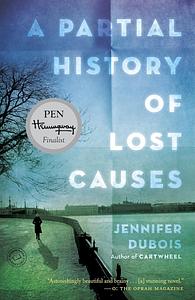Take a photo of a barcode or cover
Beautiful writing. I wanted Irina to be stronger or more forceful or something. But in the end, I liked the way the author wrote her.
emotional
hopeful
reflective
sad
medium-paced
Plot or Character Driven:
Character
Strong character development:
Yes
Loveable characters:
Complicated
Diverse cast of characters:
No
Flaws of characters a main focus:
Yes
Three and a half. Good but not great. I think she's a pretty interesting writer though.
This book could have used a much more discerning editor. This book has a whole lot of language that goes a whole lot of nowhere. DuBois tried too hard to develop deep insights and she relied too much on writing the characters' thoughts. I kept waiting for the pace to pick up but any time there was any kind of action (e.g. the chess match with the Russian champion or the end of Irina's story), it was over in a few sentences. I had a hard time getting through this book.
Wow. Hard to believe this is a first novel. Dubois's writing is elegant and fearless. She weaves together the two strands of her narrative and maintains two quite distinct voices throughout, while telling a deeply moving story AND illuminating recent Russian history that probably escaped many of us in the West. Brilliant.
Saw this on an NPR best list, so decided to check it out. It was quite good, and a bit of a page turner.
An intriguing connection of stories sharing vague similarities. I felt held at arms length by the protagonist, matching the theme of the story. Fascinating look at shared fates.
Beautifully written, I love the mixture of politics, chess, music, mortality, grief, and language. Bravo.
Frankly, I chose to read this book as it was one of the few available ones to download via the library on Overdrive, and it is written by an Iowa Writer's Workshop graduate. The novel follows two main characters: Bezetov, a Russian chess master who goes into liberal politics over a span of about 30 years, and Irina, a young woman whose father died of Huntington's disease and passed it on to her. We follow her for roughly two years before the onset of the illness when she tries to connect with Bezetov to follow up on a question her father had for him. Interesting premise, interesting history of Russia, but a little long with too many internal dialoques to highly recommend it. The story line hooked me enough to not abandon the novel, but am glad to have finished....
Jennifer Dubois' debut novel, A Partial History of Lost Causes, is one of the more artfully written novels I've read in a long time. Here's an example of one of the many passages that exhibits Dubois' talent:
"…and an overgenerous fractured light came in through the windows. It was the kind of light that seemed to be throwing itself at your feet to beg for mercy. Or maybe the kind that falls down on its own knife in the name of honor.”
Dubois' characters seem to see a cruel, corrupt, perhaps hopeless world in these beautiful, poetic terms — and it's almost enough to distract them, and the reader, from the fact that their lives (and our lives!) are, at their most base, lost causes — because, quite obviously, we're all going to die. That's true, whether you're the victim of a debilitating disease like Huntington's that causes you to lose your sense of self, or whether you've devoted what remains of your life to a conviction that has no chance of success.
The former describes Irina Ellison, the 30-year-old Bostonian whose father lost himself, and then died of Huntington's disease. And doctor's have suggested the hereditary disease will hit her at about age 32 — so the clock is ticking on Irina remaining who she has come to know as herself. "When you are the lost cause, this makes for a lonely life," she says.
The latter describes the other protagonist (the novel is told in chapters alternating between the two characters' points of views, like chess moves) a chess prodigy named Aleksandr Bezetov, who we first meet in the early 1980s, moving to Leningrad to attend a chess academy. Aleksandr alternates in life between political conviction and the decadent lifestyle his fame as a chess champion affords."...his whole life had been about trying — and failing — to come to grips with the inevitable."
The touchstone for the plot is that Irina finds a letter her chess-playing father, who followed Aleksandr's career closely, had written to Aleksandr asking him what he does when, in the course of a game of chess, he knows he's going to lose. How does he deal with a game that's a lost cause? The life-chess metaphor is one we follow through the rest of the novel, as Irina decides to run away from her life in Boston to go to Russia (it's 2006 now) to track Aleksandr down and find the answer to her father's question — since she's soon to be in the same predicament.
The story itself, while interesting, isn't nearly as strong as the words used to tell it. But this is still a joy to read — and it's not just the illusory, imaginative passages that make it so. It's also how Dubois constructs the theme of hopelessness to make it feel somehow hopeful, and how Dubois' writing exhibits a sagacity and insightfulness you'd expect from a much, much older writer. (Dubois is 29, and was recently named by The National Book Foundation as one of its 5 under 35 honorees.) An example:
"...and that was the bottom line, he often thought: not that you could be sure that nothing would work, but that you could be sure you would never, never know what would."
I read this novel slowly — both to savor the writing, but also because the writing (and story) has to be taken in short doses to appreciate fully. But I'd highly recommend this for fans of smart literary fiction.
"…and an overgenerous fractured light came in through the windows. It was the kind of light that seemed to be throwing itself at your feet to beg for mercy. Or maybe the kind that falls down on its own knife in the name of honor.”
Dubois' characters seem to see a cruel, corrupt, perhaps hopeless world in these beautiful, poetic terms — and it's almost enough to distract them, and the reader, from the fact that their lives (and our lives!) are, at their most base, lost causes — because, quite obviously, we're all going to die. That's true, whether you're the victim of a debilitating disease like Huntington's that causes you to lose your sense of self, or whether you've devoted what remains of your life to a conviction that has no chance of success.
The former describes Irina Ellison, the 30-year-old Bostonian whose father lost himself, and then died of Huntington's disease. And doctor's have suggested the hereditary disease will hit her at about age 32 — so the clock is ticking on Irina remaining who she has come to know as herself. "When you are the lost cause, this makes for a lonely life," she says.
The latter describes the other protagonist (the novel is told in chapters alternating between the two characters' points of views, like chess moves) a chess prodigy named Aleksandr Bezetov, who we first meet in the early 1980s, moving to Leningrad to attend a chess academy. Aleksandr alternates in life between political conviction and the decadent lifestyle his fame as a chess champion affords."...his whole life had been about trying — and failing — to come to grips with the inevitable."
The touchstone for the plot is that Irina finds a letter her chess-playing father, who followed Aleksandr's career closely, had written to Aleksandr asking him what he does when, in the course of a game of chess, he knows he's going to lose. How does he deal with a game that's a lost cause? The life-chess metaphor is one we follow through the rest of the novel, as Irina decides to run away from her life in Boston to go to Russia (it's 2006 now) to track Aleksandr down and find the answer to her father's question — since she's soon to be in the same predicament.
The story itself, while interesting, isn't nearly as strong as the words used to tell it. But this is still a joy to read — and it's not just the illusory, imaginative passages that make it so. It's also how Dubois constructs the theme of hopelessness to make it feel somehow hopeful, and how Dubois' writing exhibits a sagacity and insightfulness you'd expect from a much, much older writer. (Dubois is 29, and was recently named by The National Book Foundation as one of its 5 under 35 honorees.) An example:
"...and that was the bottom line, he often thought: not that you could be sure that nothing would work, but that you could be sure you would never, never know what would."
I read this novel slowly — both to savor the writing, but also because the writing (and story) has to be taken in short doses to appreciate fully. But I'd highly recommend this for fans of smart literary fiction.




